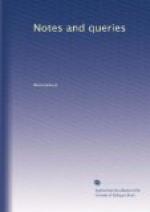E.S. JACKSON
America.—The probability of a short western passage to India is mentioned in Aristotle de Coelo, ii., near the end.
F.Q.
Pascal’s Lettres Provinciales.—I take the liberty of forwarding to you the following “Note,” suggested by two curious blunders which fell under my notice some time ago.
In Mr. Stamp’s reprint of the Rev. C. Elliott’s Delineation of Romanism (London, 8vo. 1844), I find (p. 471., in note) a long paragraph on Pascal’s Lettres Provinciales:—
“This exquisite production,” says the English editor, “is accompanied, in some editions of it, with the learned and judicious observations of Nicole, who, under the fictitious name of Guillaume Wendrock, has fully demonstrated the truths of those facts which Pascal had advanced without quoting his authorities; and has placed, in a full and striking light, several interesting circumstances which that great man had treated with perhaps too much brevity. These letters ... were translated into Latin by Ruchelius.”
From Mr. Stamp’s remarks the reader is led to conclude that the text of the Lettres Provinciales {278} is accompanied in some editions by observations of Wendrock (Nicole), likewise in the French language. Now such an assertion merely proves how carelessly some annotators will study the subjects they attempt to elucidate. Nicole translated into Latin the Provincial Letters; and the masterly disquisitions which he added to the volume were, in their turn, “made French” by Mademoiselle de Joncoux, and annexed to the editions of 1700, 1712, 1735.
As for Rachelius, if Mr. Stamp had taken the trouble to refer to Placcius’ Theatr. Anonym. et Pseud., he night have seen (Art. 2,883.) that this worthy was merely a German editor, not a translator of Pascal cum Wendrock.
The second blunder I have to notice has been perpetrated by the writer of an otherwise excellent article on Pascal in the last number of the British Quarterly Review (No. 20. August). He mentions Bossuet’s edition of the Pensees, speaks of “the prelate,” and evidently ascribes to the famous Bishop of Meaux, who died in 1704, the edition of Pascal’s Thoughts, published in 1779 by Bossuet. (See pp. 140. 142.)
GUSTAVE MASSON.
Porson’s Epigram.—I made the following Note many years ago:—
“The late Professor
Porson’s own account of his academic visits
to the Continent:—
“’I went to Frankfort,
and got drunk With that most learn’d
professor—Brunck:
I went to Worts, and got more drunken, With
that more learn’d professor
Ruhncken.’”
But I do not remember where or from whom I got it. Is anything known about it, or its authenticity?




